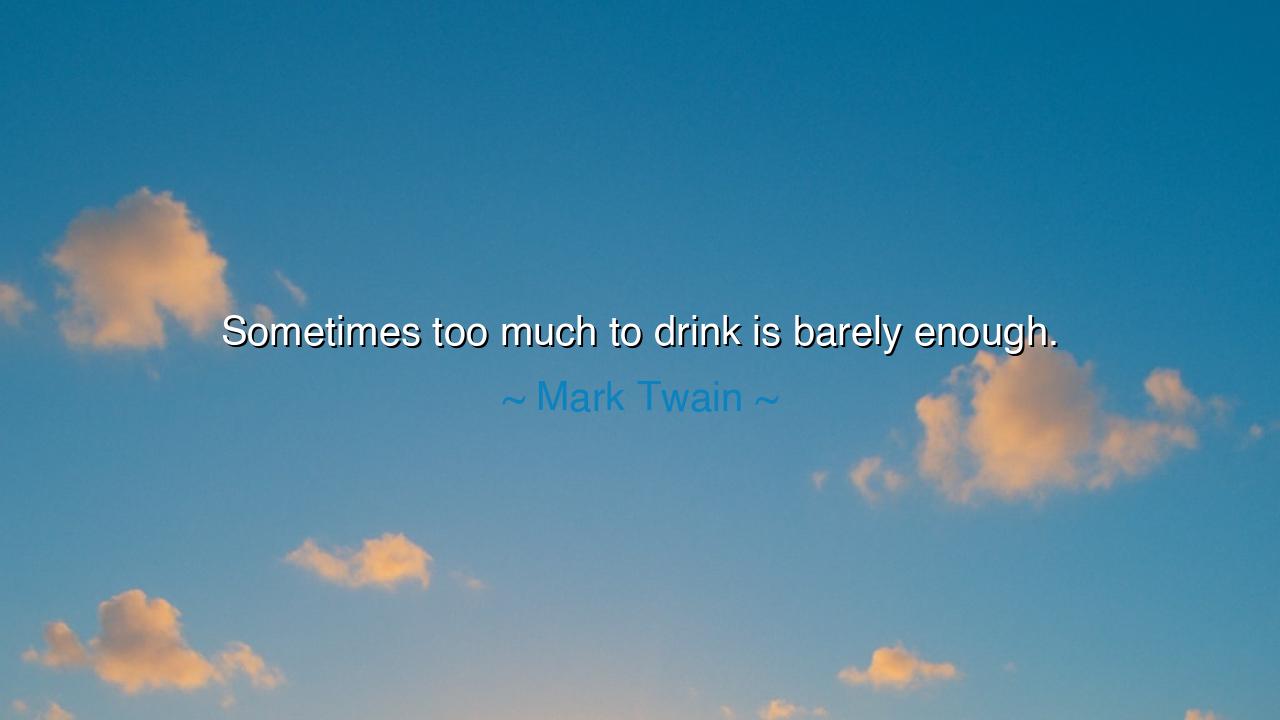
Sometimes too much to drink is barely enough.






Mark Twain, master of wit and chronicler of human folly, once declared: “Sometimes too much to drink is barely enough.” Though his words sparkle with humor, beneath them lies a deeper commentary on the restless hunger of the human heart. He speaks not merely of drink, but of the insatiable desire within men and women to press beyond moderation, to taste excess, to seek in abundance the fleeting illusion of fulfillment. It is both a jest and a warning, both laughter and lament, for in it we glimpse the paradox of human longing.
The origin of this thought is tied to Twain’s own life, a man who lived amidst the roaring spirit of the 19th century, an age of saloons, riverboats, and ceaseless adventure. Known for his sharp observations, Twain often cloaked truths in jest so that they might strike deeper into the conscience. When he speaks of too much being barely enough, he captures the restless spirit of his era—and indeed of all eras—where men drown their weariness, their failures, or their joys in the cup of indulgence, always chasing satisfaction that slips away like water through fingers.
The ancients, too, spoke of this desire for more. In the symposiums of Greece, men drank not only wine but ideas, letting cups overflow as words of philosophy and passion mingled. Plato himself warned of the dangers of excess, yet he also admitted that within drunkenness there can arise truth, as inhibitions fall away and the soul reveals its rawest longings. Thus Twain’s jest carries echoes of this ancient paradox: sometimes the excess itself uncovers what lies hidden beneath the polished mask.
Consider the tale of Alexander the Great, who in one fateful banquet drank beyond measure, and in his passion quarreled with his beloved friend Cleitus, striking him down in drunken rage. In that moment, Alexander tasted the bitterness of excess—the recognition that what seems “barely enough” in desire may destroy what is dearest. His sorrow in the aftermath stands as eternal testimony that the pursuit of more without measure leads to loss. Twain, with humor instead of tragedy, reminds us of this eternal tension.
Yet Twain’s words are not only about warning. They also celebrate the wildness of human spirit, the refusal to always live in restraint. There is joy in laughter that is too loud, in stories told too long, in toasts raised too often. Sometimes, to live fully, one must allow the cup to spill over. Life is brief, and in certain moments, moderation feels like betrayal to the heart’s cry for abundance. Thus his quote is double-edged: it celebrates our thirst for life, even as it winks at the danger of drowning in it.
The lesson, then, is to recognize both truths. Indulgence may bring joy, but it must not become the master. One may allow themselves the feast, the dance, the overflowing cup—but also must remember that what is “barely enough” one night may become too heavy a burden the next day. Wisdom lies not in denying all pleasure, nor in surrendering to endless excess, but in discerning when the soul needs a taste of abundance and when it needs the clarity of restraint.
Practical action flows from this teaching. Celebrate with vigor when the time is right—at the wedding, at the victory, at the turning of the year. Do not be so bound by caution that you miss the sweetness of joy. But also cultivate the discipline to step back, to know your limits, to guard your health, your mind, and your relationships. Let the laughter of Twain guide you, but let the wisdom of history temper you.
So, children of tomorrow, remember: life is both feast and fast, both fullness and emptiness. Sometimes, as Twain jests, “too much” feels like “barely enough.” But in truth, enough lies not in the bottom of the cup, but in the balance between joy and judgment. Drink deeply of life—but never forget that the truest intoxication comes not from the wine itself, but from the gratitude of being alive.






AAdministratorAdministrator
Welcome, honored guests. Please leave a comment, we will respond soon